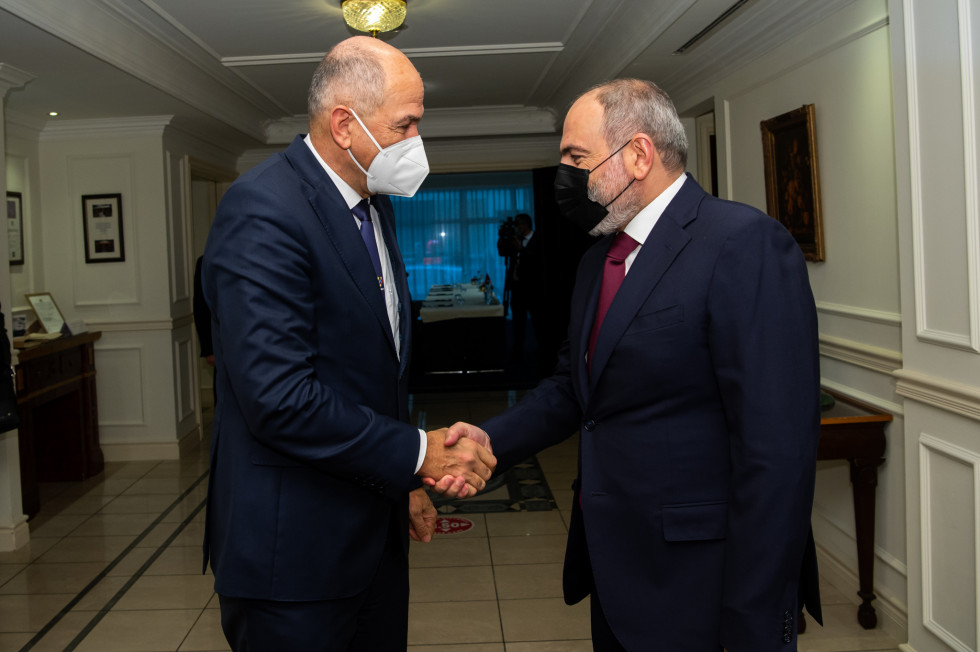Prime Minister Janša holds bilateral meetings at the Eastern Partnership summit
- Former Prime Minister Janez Janša (2020 - 2022)

Prime Minister Janša met with Armenian Prime Minister Nikol Pashinyan | Author Kabinet predsednika vlade
The central aim of the summit is to adopt the post-2020 programme agenda, including a 2.3 billion euro Economic and Investment Plan. The EaP post-2020 programme priorities are concentrated on strengthening the partner countries’ resilience across a range of areas (economic, environmental, climate, digital and social – independent institutions and the rule of law).
In the margins of the summit, Prime Minister Janša met with Ukrainian President Volodymyr Zelensky, Armenian Prime Minister Nikol Pashinyan and Belarus opposition leader Svetlana Tikhanovskaya. Before the summit, he also attended an informal lunch with the leaders of Ukraine, Moldova and Georgia, organised by the President of Lithuania, Gitanas Nausėda.
In his talk with Belarus opposition leader Svetlana Tikhanovskaya, Prime Minister Janša spoke about the recent developments in Belarus. "We are grateful for the updates on the current situation in Belarus," said the Prime Minister after the meeting, adding that "we were shocked to learn about the convictions of political prisoners, which we believe to be a sign of nervousness on the part of dictator Lukashenko. Sentencing someone to 18, 15 or 10 years in prison for political activities is a disproportionate reaction. Above all, these convictions are not a sign of the regime's strength, but of its weakness, which I believe reflects the dictator Lukashenko's realisation that he has made a big mistake by abusing illegal migrants and threatening the entire EU. Now that this strategy has failed, nervousness is rising, and this is why there are such punishments for political opponents," said the Prime Minister. "The Belarusian opposition has our full support. We believe that in the very near future, it will be this opposition that will lead a free Belarus," said the Prime Minister. He added that discussions were also held on the draft documents to be discussed at the EU–Eastern Partnership summit and at the European Council. "In both texts, there is strong support for the people of Belarus, a free Belarus and political prisoners," said the Prime Minister, adding that the talks with the Belarusian opposition leader also focused on how to help the families of political prisoners.
Later in the day, the Prime Minister also attended an informal working lunch between the Heads of State and Government of the member states of the European Union, the President of Moldova, the President of Ukraine, and the President of Georgia. The meeting focused on the topics that will be on the agenda of the Eastern Partnership Summit.
After the working lunch, the Prime Minister met with the President of Ukraine, Volodymyr Zelenskiy. The Slovenian Prime Minister and the Ukrainian President signed the joint declaration on the European perspective of Ukraine. In bilateral talks, they exchanged views on the situation in Ukraine and the EU's relations with the Eastern Partnership.
In a statement to foreign media, Prime Minister Janez Janša stressed that the Eastern Partnership is of great importance, "not only from a political and economic point of view, but also from the point of view of strategy and security". The Prime Minister went on to say: "The EU has an ambitious investment agenda, which focuses on areas of common interest and on helping a trio of countries – Moldova, Ukraine and Georgia – to move faster towards EU membership. During its presidency of the Council of the EU, Slovenia has been campaigning for the future EU membership of countries, as well as for setting a timetable for enlargement." Prime Minister Janša concluded by saying: "In the next 10 years, both sides should take concrete steps towards enlargement."
The Eastern Partnership aims to intensify political and economic integration with the partner countries of Eastern Europe and the South Caucasus, i.e. Armenia, Azerbaijan, Georgia, the Republic of Moldova and Ukraine. Security, stability and prosperity, as well as democracy and the rule of law in Eastern Europe and the South Caucasus are a priority for the EU.
Cooperation between the EU and the Eastern Partnership countries is even more important now, in the midst of the COVID-19 pandemic. As part of its global response to the coronavirus outbreak, the EU has mobilised an emergency aid package for the Eastern Partnership countries worth up to €1 billion. The EU has allocated the funds to the partner countries to assist national health systems and to mitigate the socio-economic impact of the pandemic.

